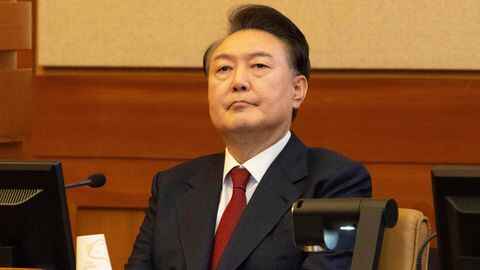As a motorcade carrying Yoon pulled into the Seoul Central District Court, security was increased.
During his court appearance, impeached South Korean President Yoon Suk-yeol’s attorneys disputed his arrest on a criminal charge that he was planning a rebellion when he temporarily declared martial law in December.
As the car carrying Yoon pulled into the Seoul Central District Court on Thursday, security was increased, and many of his fans gathered close by.
In addition to reviewing Yoon’s attorneys’ motion to have his detention revoked and him released from custody, the preliminary hearing will include witness consultations and other preparations for his criminal trial. Seldom do such challenges succeed.
On January 26, Yoon was charged with rebellion, which carries a possible death sentence or life in prison. Presidents in South Korea are exempt from most criminal proceedings, with the exception of those involving treason or insurrection.
According to the accusation, he illegally attempted to shut down the National Assembly and imprison election officials and legislators by imposing martial law. Yoon, a conservative, has stated that he had always intended to accept lawmakers’ choice if they voted to lift martial law, and that his announcement was meant to serve as a short warning to the liberal opposition.
The trial was characterized as a “significant event in constitutional history” by Yoon’s attorney, Kim Hong-il.
He warned the court that he was “witnessing a reality where illegality compounds illegality” and stated that the courts must act as the stabilizing force.
His request was to “ensure that the defendant’s rights are not unjustly violated” by the court.
The fate of Yoon is in doubt.
When Yoon was impeached on December 14, his presidential powers were suspended. The Constitutional Court of South Korea is currently deliberating whether to legally remove him from office or to overturn the Assembly’s impeachment and reinstate him.
Up to two weeks or more may pass during that process.
Park Geun-hye and Roh Moo-hyun, the previous impeached presidents, had to wait 11 and 14 days, respectively, to find out their fates.
The nation must hold new presidential elections within 60 days if Yoon is ousted.
About six hours after Yoon imposed martial law, it was lifted, but not before causing political unrest, upsetting high-level diplomatic negotiations, and putting the nation’s democracy to the test.
After the Seoul Western District Court authorized Yoon’s arrest last month, his conservative fans rioted there, and his attorneys and ruling party have publicly questioned the legitimacy of the legal system and law enforcement agencies involved in the case.






